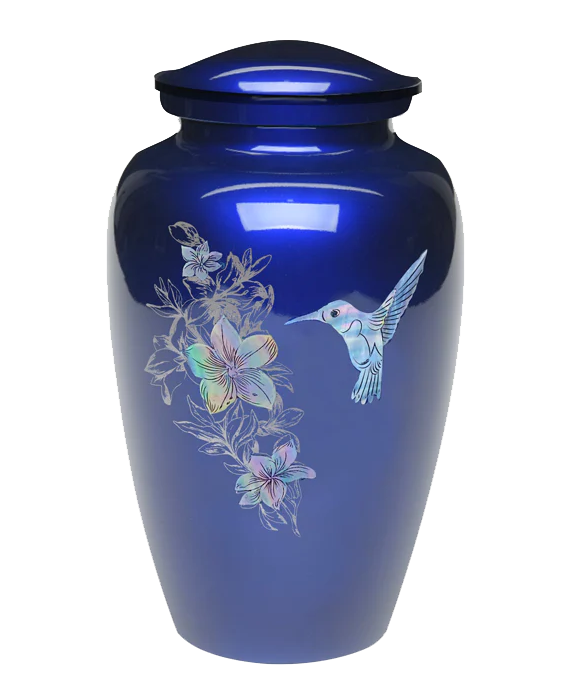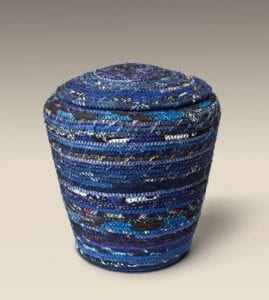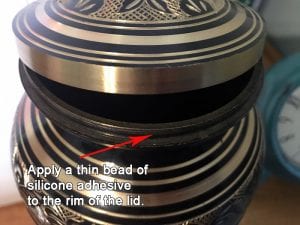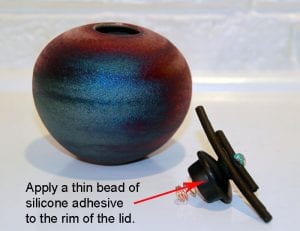Cremation Urns: How to Choose a Cremation Urn
How to Buy and What to Look For
If you have just started your search for a cremation urn, then you may be surprised by the wide variety of options available. There are truly urns for every taste and budget, from simple wooden boxes to hand-polished marble.
The wide variety of selections can be overwhelming, especially if you are deciding at a difficult time. Luckily, there are questions you can ask yourself to start narrowing down your choices.
Evaluating Urn Options: Narrowing Down Your Choices
1. What style of urn do you want?
You want to ensure that the urn you select reflects the wishes and tastes of the deceased and their loved ones. A biodegradable urn might be best if the deceased was concerned about the environment. You probably don’t want an overly ornate version if the person you are buying for had simple tastes. Chances are, you’ll know which urn is perfect when you see it, but keeping the deceased’s personality can help make the process more personal.
2. What is your budget?
It may be hard to think of terms of money when choosing an urn to honor a loved one, but urns are available in various price ranges. Deciding how much you want to spend before you start looking can help narrow your choices significantly.
3. Where will the remains be stored?
If you place your urn in a mausoleum, the funeral home or cemetery can provide you with any specifications you need to consider when you make your selection. In some cases, the urn must be no larger than a specific size and made of certain materials. A “Green” cemetery may require that your urn be made of biodegradable materials. If the urn is buried at a cemetery, you must purchase an urn vault. The vault will protect the urn and keep the ground around it from collapsing. If you keep the urn at home, you will need to think about where you will store it: will it be indoors or out, and will it be buried? If you plan to bury the urn at home, check your local laws to ensure this is permitted.
4. Will you be traveling with the remains?
The Transportation Security Administration (TSA) has special requirements for transporting urns. For example, urns must be able to be x-ray scannable. In addition, some airlines have guidelines for transporting cremated remains. Be sure to check with your carrier before you travel. It may make sense to purchase a temporary urn that meets TSA and airline requirements and then transfer the remains to something more permanent once you get home. (Click here to go to the TSA blog page that discusses traveling with cremated remains.)
5. Will you inter all the remains or distribute them among others?
Your crematory can provide you with an estimate of how much cremains will be returned to you. This can help you decide how large you would like your urn to be. You may prefer to buy several smaller urns if you distribute the cremains between others.
6. Will you scatter the ashes?
Scattering ashes can be a bit more complicated than it seems. Wind and weather conditions can complicate things. Depending on where you plan to scatter the ashes, you may want to purchase a specially designed container for this purpose. Learn more about Scattering Ashes.
7. Would you like your urn personalized?
There are many options when it comes to personalizing your container. Many urns have a place for a photo or other tribute to your loved one. Perhaps you would like to commemorate a special hobby or profession. There are also options available for couples, pets, and infants.
8. How do you want to receive the ashes?
The crematorium will return the ashes in a plastic bag. The bag will be placed in a container of some kind. If you have purchased an urn, you can provide it to them in advance of the cremation, and they will return the ashes in your urn. Otherwise, the ashes will be returned in a temporary urn. Since the ashes are in a plastic bag, they can be easily moved to a permanent urn later. Your funeral director will be happy to help you handle and transfer the ashes. Also, see our article on sealing cremation urns.
9. What size urn should you buy?
Use the 1 to 1 rule of thumb. It is important that the urn you select is the right size to hold the ashes. The capacity of urns is measured in cubic inches. The general rule is one cubic inch of urn capacity for each pound of body weight prior to death. For example, the ashes of a 175 lb. man would need an urn of 175 cubic inches or more. Likewise, the ashes of a 25 lb. pet would require an urn of 25 cubic inches or more. If the ashes are being shared among family members, smaller keepsake urns are a good option, and you can use the one cubic inch to 1 lb. rule of thumb when purchasing these smaller urns. Some people choose to place keepsakes of their loved ones in the urn along with the ashes. You’ll need to account for the space that any keepsakes will require.
Most importantly, you should take your time, consider all your options, and remember that you do not have to purchase through the funeral home or crematory. There are many online vendors. We recommend you visit our store to see what we have to offer. We carry a variety of styles and prices.
Cremation Urns Come In All Shapes and Sizes
From classic traditional urns to more modern takes, you may be surprised by the number of options available to you. There are burial urns available to meet every taste and style. Despite the variety, urns fall into two basic categories: permanent and non-permanent. The main difference is that permanent urns do not degrade over time. Non-permanent urns, also referred to as biodegradable, will decompose. Whether or not an urn is permanent or biodegradable depends on the material it is made of.
Permanent Urns
Permanent urns are typically glass, hardwood, metal, ceramic, bronze, or marble. You can find them in hundreds of styles. In addition to traditional urns, examples of the types of permanent memorial urns for storage of cremation remains are:
- Sports themed urns
- Military themed urns
- Hobby themed urns
- Religious themed urns
- Art themed urns
- Photo urns
- Memento urns
- Urns for travel
You can select a permanent urn based on its material or style; you can also find urns suitable for interring the remains of two people who want to share their final resting place. These are called companion urns.
If you are looking for an urn to memorialize the untimely death of a child, you may want to investigate cremation urns specifically designed for infant or child remains. If you plan to divide the remains among friends or family members, you can choose from various small keepsake cremation urns designed for this purpose.
Personalized Cremation Urns
If you are looking for a cremation urn that is a little less traditional, you may opt for something more unusual such as a teddy bear that includes storage for remains or an hourglass that holds your loved one’s ashes rather than sand. Despite the number of options available when it comes to permanent burial urns, sometimes the best choice is to have an urn specially designed to fit the personality of your loved one or the style of the space where it will be stored. There are numerous personalization and customization options available.
Check out our “This is not your Grandmother’s Cremation Urn” post
Biodegradable Cremation Urns

Non-permanent urns are usually made of paper, but you may also find them made of salt, cornstarch, gelatin, or other degradable materials. Biodegradable urns are thought to be an environmentally friendly alternative to traditional urns since they don’t leave behind permanent materials and are becoming increasingly more popular. Biodegradable urns are available in designs suitable for display, burial, or scattering. There are also options for use in water burials. Some biodegradable urns may have seeds embedded in the paper to produce a tree or other plant after it decomposes. Others are designed as birdhouses. The choices are many and growing by the day.
With the number of options available, the job of selecting the perfect urn to honor your loved one can seem a daunting task. You can make the selection a bit easier by narrowing down your options.
SEALING CREMATION URNS — CREATING A PERMANENT CLOSURE
Whether or not to seal a cremation urn is a personal decision that depends on the type of urn, if it will be displayed or buried, and your unique circumstances. The sealing process is not complicated, but it can be surprisingly emotional. For many people, sealing the urn represents a final step in their loved one’s journey. With that in mind, it’s best to set aside some quiet time so that you can take it at your own pace.
Metal Urns
 Most metal cremation urns have a threaded cap or removable disc covering the ash compartment. To create a permanent seal, add a small amount of clear silicone epoxy or metal glue to the threads before closing the lid. Take your time, and be sure to wipe away any overspill quickly.
Most metal cremation urns have a threaded cap or removable disc covering the ash compartment. To create a permanent seal, add a small amount of clear silicone epoxy or metal glue to the threads before closing the lid. Take your time, and be sure to wipe away any overspill quickly.
Sealing cremation urns made of metal — bronze and brass, for example, is usually unnecessary. However, some people prefer the added sense of security that the glue can provide.
Ceramic or Glass Urns
Many ceramic and glass urns are designed with a cap that rests on the top of the urn’s body but is not threaded. To seal the lid to the urn, use a clear silicone sealant. The sealant will help provide water resistance and create a permanent airtight seal.
 When sealing cremation urns made of ceramic or glass, carefully squeeze a thin bead of sealant around the cap, then place the lid back on the urn, gently pressing it into place. Be sure to follow the directions on the adhesive with regard to drying time. We recommend you let the sealant dry for 24 hours before handling it.
When sealing cremation urns made of ceramic or glass, carefully squeeze a thin bead of sealant around the cap, then place the lid back on the urn, gently pressing it into place. Be sure to follow the directions on the adhesive with regard to drying time. We recommend you let the sealant dry for 24 hours before handling it.
Sealants can be purchased at hardware stores, online, and where ever home repair goods are sold. Avoid glues that expand or foam. While soap and water cleanup is not essential, it is a big bonus.
Wooden Urns
Most wood urns close in a box-like fashion or have a sliding panel at the bottom that is removable. There is no need to seal, but some people prefer to do so. Wood glue or glue designed for porous materials will work for this purpose. Just remember that you are creating a permanent seal, so if you change your mind, you may not be able to reopen the box.
See the urns recommended by Funeralwise:

